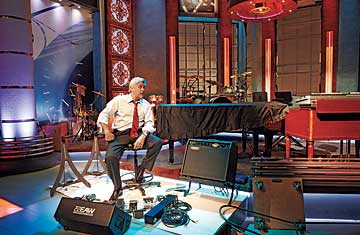
One challenge Leno, on his new set, faces is pleasing old fans without seeming to copy The Tonight Show.
(2 of 8)
For the moment, Leno is not focused on the future of TV. He's pausing on a comfy couch in his dressing room; relaxing is not the word, since Leno doesn't exactly relax. When he was hosting The Tonight Show, he would do 160 stand-up gigs a year. He worked Fridays (unlike David Letterman), didn't vacation and only grudgingly took holidays--"sometimes Thanksgiving, so [the staff] could be with their families," he says. Even now, one foot wiggles like an engine on idle. He would rather be working on something.
For instance, planning his show: how to organize it, how to pace it, how to distinguish it from Tonight while keeping the familiar features his old fans expect. (Bandleader Kevin Eubanks will return, and already Leno has gone back on an earlier declaration to do the show without a desk, allowing that he'll need one for seated-comedy bits.) Like Tonight, the new show will kick off with a topical monologue. On Leno's coffee table is a cue card with the beginnings of a joke from a practice run: "The Amsterdam city council wants a bailout of the prostitution business ..."
Also like Tonight, The Jay Leno Show will occupy five hours of NBC's real estate. If it hits, it will be like five hits at once. And yet it's hard to see the move by the once dominant network as anything but a gamble, though Leno plays down his responsibility for "saving" the Peacock. "The network is on its own," he said at a press conference this summer. "Screw them."
Actually, NBC has done a fantastic job of screwing itself, and that's why Leno has a new show. The Peacock has been the fourth-place network since 2004. It had no top-30 shows besides football last season; Heroes, The Office and 30 Rock are niche hits at best. It's had few major successes since Jeff Zucker, now president and CEO of NBC Universal, took over the network in 2000. Two years ago, it hired 36-year-old producer Ben Silverman to revive the network. A string of wild parties, gaffes and high-profile flops (Knight Rider, Kath & Kim, Rosie Live) later, Silverman announced in July he would leave the network to pursue the proverbial "opportunities."
On top of all this, five years ago, NBC, as if it had things too easy, announced it would ditch its most successful and reliable moneymaker, Leno, and give The Tonight Show to Conan O'Brien. "The logic behind it was, you get rid of someone while they're on top, so the transition is easier," says Leno. "I don't really see that analogy in sports. 'He's scoring touchdowns, so we've got to get rid of him immediately!'" Still, the host, who believes in not taking business personally--in his words, "Never fall in love with a hooker"--was publicly agreeable.
But Leno also believes in working, and as it became clear that he wasn't ready to retire and tinker in his garage, NBC had to find a job for him or see him go to a competitor, probably ABC. At the same time, the network had a hole in its prime-time schedule big enough to drive Leno's car collection through. Its 10 p.m. dramas (like Lipstick Jungle and My Own Worst Enemy) were regularly slaughtered--by CBS's crime procedurals, in particular--and it hadn't developed a hit for that hour in years. So after considering several possibilities--an 8 p.m. half-hour show, prime-time specials--Zucker offered 10 p.m. to Leno.
